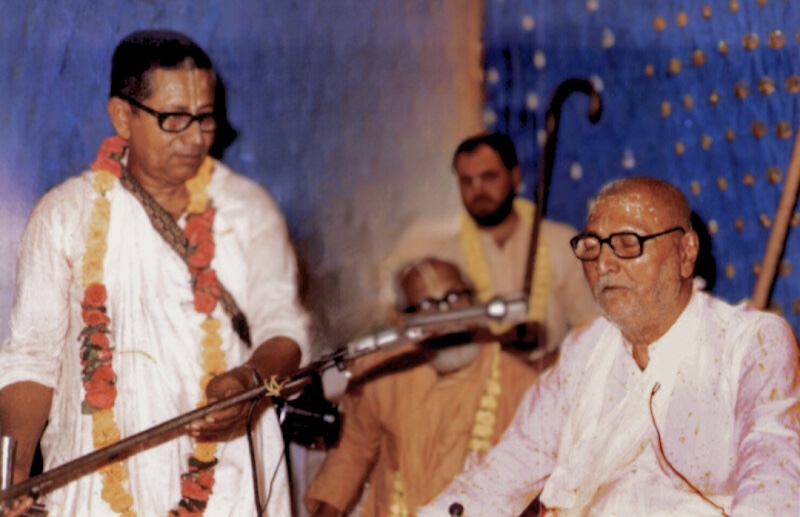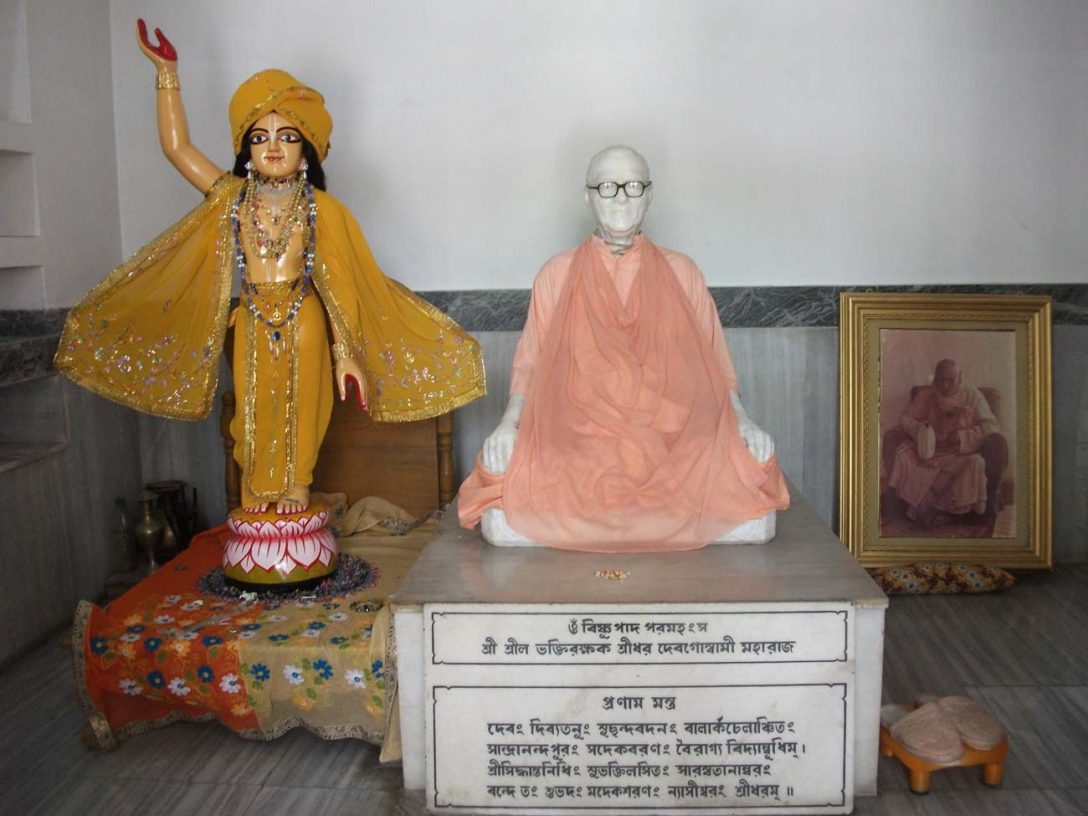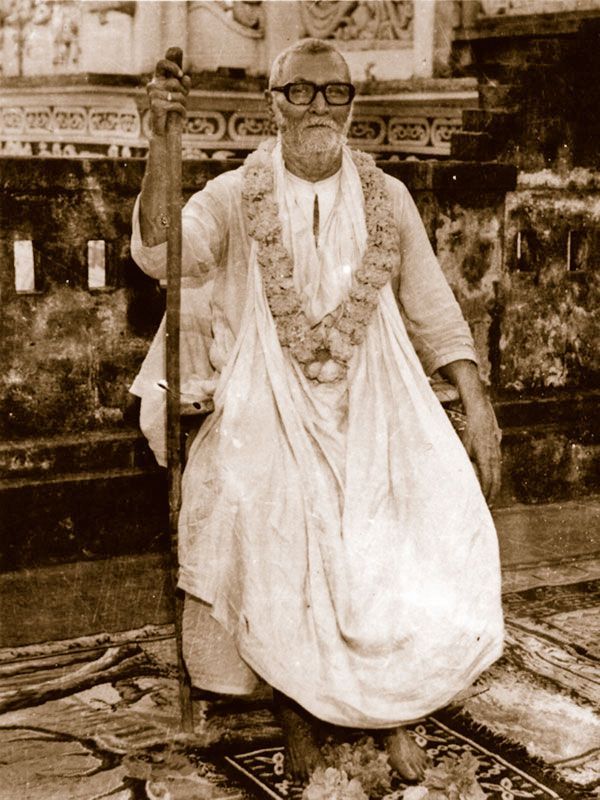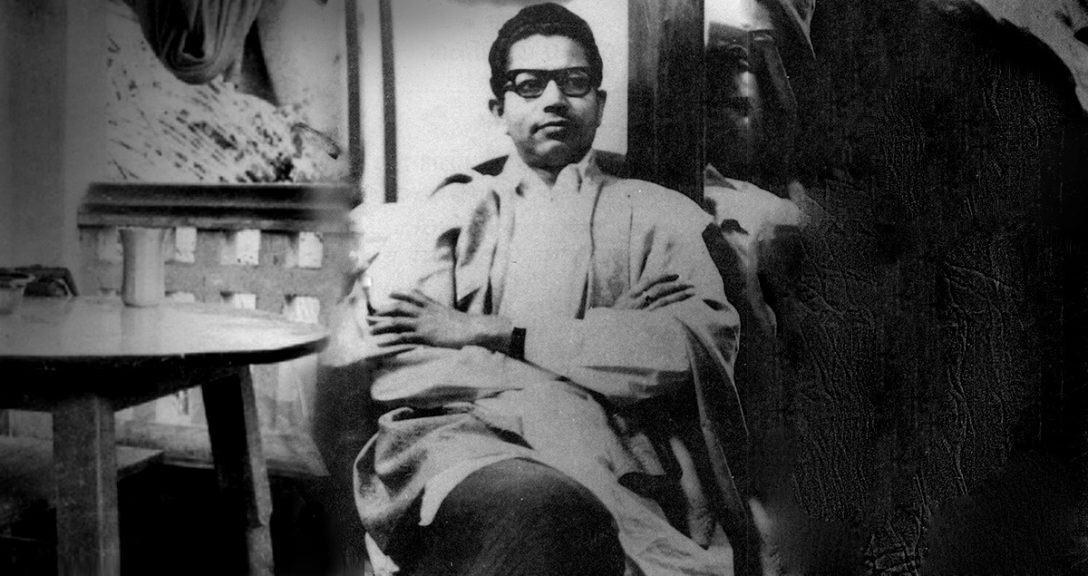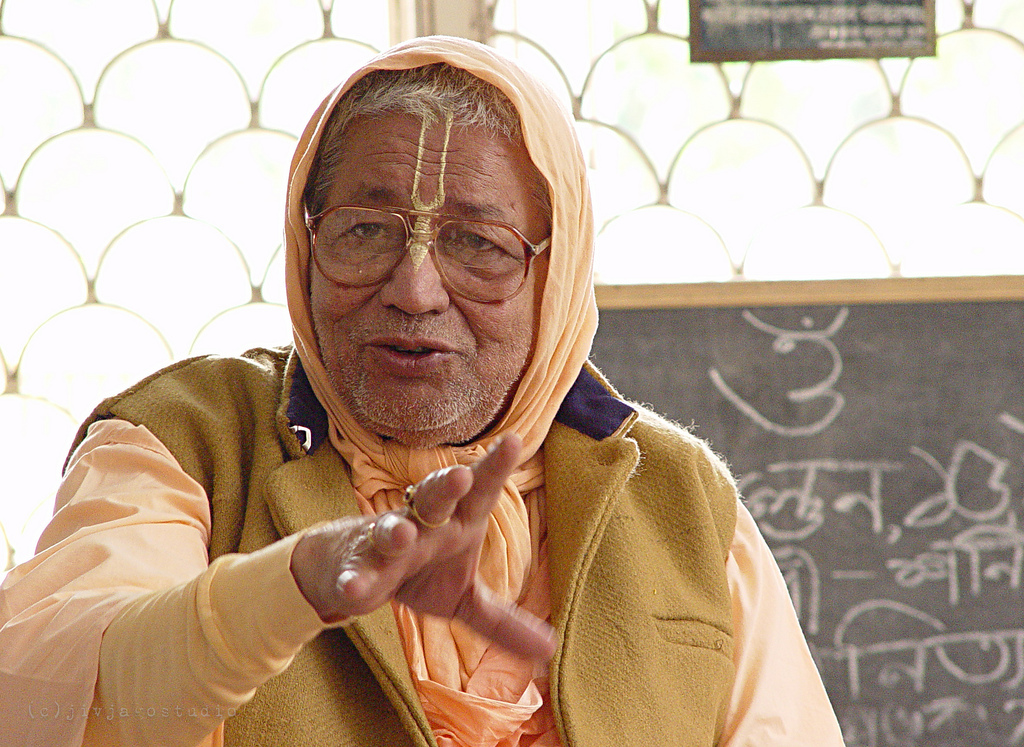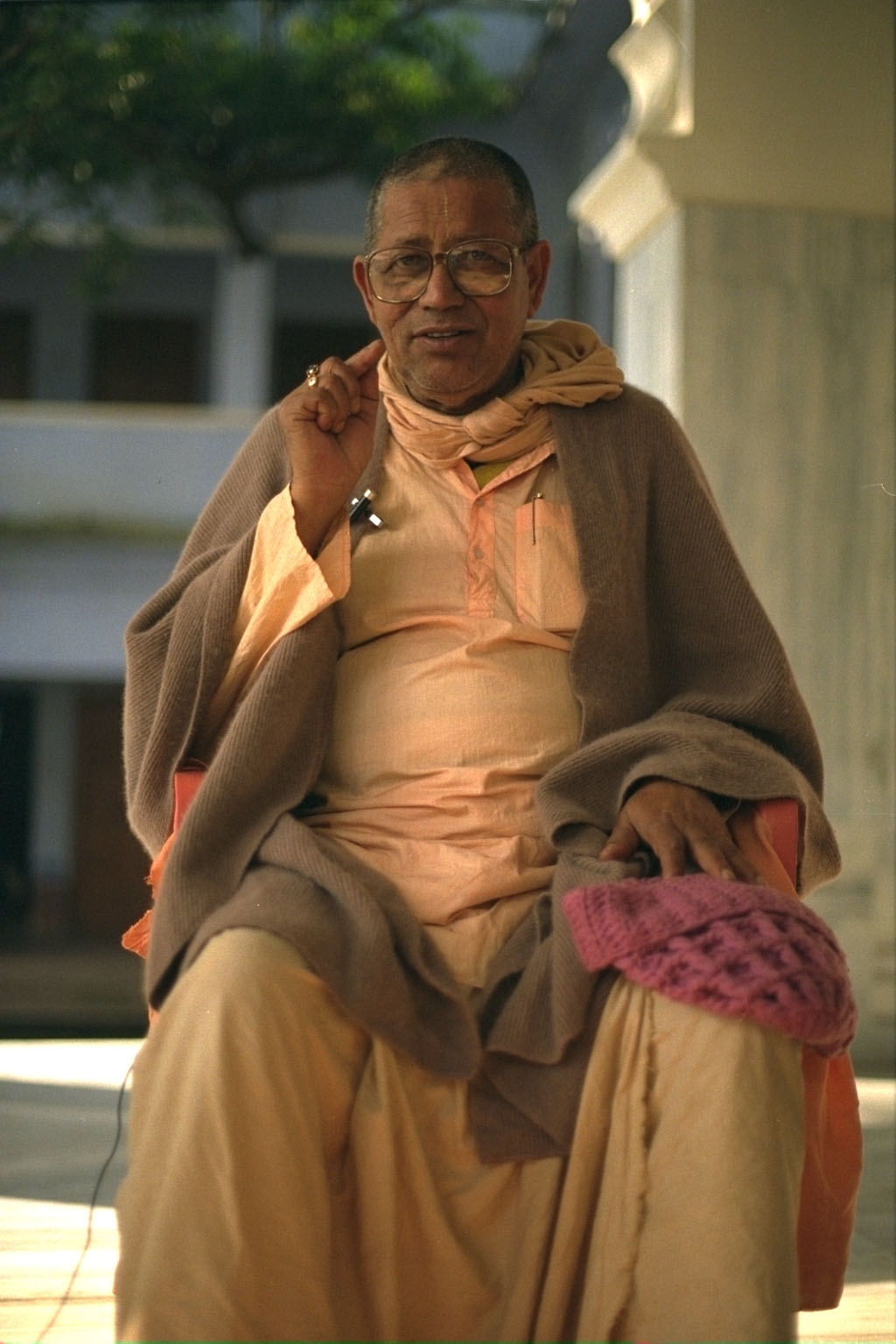By Śrīla Bhakti Sundar Govinda Deva-Goswāmī Mahārāj.
In the descriptions of the path of pure devotional service in Srimad Bhagavatam, the phrases Guru-devatatma[1] and Gurv-atma-daivatah[2] have been used. In the explanations of the Acharyas of the bhakti scriptures, we find Gurur eva Devata Atma cha[3], that is, Sri Guru has been ascertained to be the worshippable object of our love. In the Vedas, unwavering bhakti yatha Deve tatha Gurau[4] [“As to the Lord, so to Guru”] has been mentioned. Acharyam Mam vijaniyat[5] [“Known Me to be the Acharya”]: this too is an instruction that has issued forth directly from the mouth of the Lord. Further, in the instructions of the Acharyas of the bhakti scriptures, statements can be seen, such as Mukunda-presthatve Guru-varam[6] and Kintu Prabhor yah priya eva[7], which have directed us in our vision of Sri Guru towards one who is dear to the Lord.
In vision full of unbridled faith (sraddha), variegated spiritual reality (chit-savisesa-tattva) shines brightly. When the aspect of Saktiman’s non-difference from the svarup-sakti is shown, then Sri Guru and the Lord are seen to be one. When, however, the state of eternal distinction between the recipient of service (sevya) and the servitor (sevaka) manifested by the svarup-sakti in the eternal Pastimes is seen, then Sri Guru reveals himself in the form of the greatest servitor. In the service within the four types of spiritual rasa, Sri Guru is recognised as the foremost shelter (asraya) of each respective rasa or the manifestation is seen of his descent into the distinct position of a servant of himself who is nondifferent from himself.
The Lord of His own accord distributes Himself through His sakti—this is indeed truthful and reasonable. Therefore, seeing otherwise gives latitude to mundane conceptions (martya-buddhi[5]). Furthermore, the Lord’s internal energy (antaranga-sakti) is also completely absorbed in Him: Mayi te tesu chapy Aham[8] [Krishna says, “As devotees are attached to Me, so I am attached to them.”]. If we lack vision of the distinction in the Lord between the recipient of service and the servitor, then we must be excluded from the eternal Pastimes. Up until the full purification (bhuta-suddhi) of the endeavouring soul (sadhaka jiva), the pertinence of vision of the Lord in Sri Guru is predominant. Then, in the realised plane, Sri Guru’s eternal manifestation as the highest servitor within the service of a particular rasa becomes established.
Sri Guru has eternal Pastimes. Sri Guru is not simply the liberator of the conditioned soul. Rather, Sri Guru’s primary and complete manifestation is in the realised plane in his Pastimes of giving inspiration for eternal service.
A guide-less and self-centred life is troublesome and unproductive. People given to fruitless speculation, being simply unable to understand the importance of Sri Guru, go on independently making a deceptive show of seeking the Lord. Only when they accept the real form of truth-seeking will the shelter of Sri Guru shine unmistakably as the proven origin of the gift of the highest auspiciousness.
At every level from the material universe up to Goloka and as the singular and complete giver of every rasa up to parakiya madhura-rasa[9], the ultimate manifestation of Sri Guru is Sri Krishna Chaitanyadev. Amidst the wealth of His heart in His Pastimes of magnanimity (audarya-lila), all manifestations of Sri Guru are existent. Therefore, if a soul receives even a trace of a semblance of the fortune of being sprinkled with a drop of His mercy, then they can be bathed in full with the hope of complete perfection. This pervades beyond all else and is fully endowed the highest of all excellences. May Sri Govinda Panchami [the appearance day of Srila Bhakti Siddhanta Saraswati Thakur] and Sri Govinda Purnima [the appearance day of Sri Gauranga Mahaprabhu], the two greatest well-wishers of every soul, in their Pastimes of distributing Sri Guru and Sri Gauranga, be pleased with us.
guru-rupa-harim gauram radha-ruchi-ruchavrtam
nityam naumi navadvipe nama-kirtana-nartanaih
[“I offer my obeisance to Gaura, the Supreme Lord in the form of Sri Guru, who is adorned with the heart and halo of Sri Radha and dances and chants His own Name eternally in Sri Nabadwip Dham.”]
References
bhayaṁ dvitīyābhiniveśataḥ syād
īśād apetasya viparyayo ’smṛtiḥ
tan-māyayāto budha ābhajet taṁ
bhaktyaikayeśaṁ guru-devatātmā
(Śrīmad Bhāgavatam: 11.2.37)
“Forgetfulness (of the true self), misconception (of one’s identity—identification with the body and adoption of the mentality of being the rightful enjoyer of the fruits of one’s actions), and fear (suffering, samsara) created by immersion in duality (interest separate from that of the Lord and pride in the body) arise by the influence of the Lord’s illusion for those who are averse the Lord. Thus, the wise, those for whom Sri Guru is one’s worshippable Lord and dearest beloved, should serve the Lord with unalloyed devotion.”
tasmād guruṁ prapadyeta jijñāsuḥ śreya uttamam
śābde pare cha niṣṇātaṁ brahmaṇy upaśamāśrayam
tatra bhāgavatān dharmān śikṣed gurvātma-daivataḥ
amāyayānuvṛttyā yais-tuṣyed ātmātmado hariḥ
(Śrīmad Bhāgavatam: 11.3.21–2)
“Therefore (because there is no lasting fulfilment in the material world), those who are in search of the highest good should surrender to a Guru who is adept in Sabda-brahma (revelations of the Divine, the scriptures) and Parabrahma (direct experience of the Divinity), and who is an abode of tranquility (unaffected by anger, greed, etc.). Those for whom Sri Guru is the dearest beloved and worshippable Lord should sincerely and submissively learn from him those practices of devotion whereby Sri Hari, He who gives Himself (to His devotee), is satisfied.”
3: The phrase Sri Guru-devatatma, originating from Srimad Bhagavatam 11.2.37, is explained by Srila Visvanath Chakravarti Thakur in his Sarartha-darsini-tika as Gurur eva Devata Isvara atma presthas cha yasya tatha drstih sannity arthah: one has vision of Sri Guru as one’s worshippable Lord and dearmost beloved.
yasya deve parā bhaktir yathā deve tathā gurau
tasyaite kathitā hy arthāḥ prakāśante mahātmanaḥ
(Śvetāsvatara-upaniṣad: 6.23)
“The subjects we’ve discussed (all the teachings of the scriptures) are revealed to the great soul who has pure devotion to the Lord, and so also to Sri Guru.”
āchāryaṁ māṁ vijānīyān nāvamanyeta karhichit
na martya-buddhyāsūyeta sarva-deva-mayo guruḥ
(Śrīmad Bhāgavatam: 11.17.27)
[Lord Krishna to Uddhava:] “Know Me to be the Acharya. Never disrespect him, consider him a mortal, or be envious of him. He is the embodiment of all the gods.”
6:
na dharmaṁ nādharmaṁ śruti-gaṇa-niruktaṁ kila kuru
vraje rādhā-kṛṣṇa-prachura-paricharyām iha tanuḥ
śachī-sūnum-nandīśvara-pati-sutatve guru-varaṁ
mukunda-preṣṭhatve smara padam ajasram-nanu manaḥ
(Śrī Manaḥ–śikṣā: 2)
“O mind! Never engage in the dharma or adharma described in the Vedas. Rather, render full service to Radha and Krishna here in Vraja. Always remember the son of Sachi to be the son of Nanda and your beloved Gurudev to be Krishna’s dearmost.”
sākṣād dharitvena samasta-śāstrair
uktas tathā bhāvyata eva sadbhiḥ
kintu prabhor yaḥ priya eva tasya
vande guroḥ śrī-charaṇāravindam
(Śrī Gurvaṣṭakam: 7)
“I offer my obeisance unto the lotus feet of Sri Guru, who is said by all the scriptures and so also considered by the sadhus to be the Lord Himself and yet is the Lord’s dearmost.”
samo ’haṁ sarva-bhūteṣu na me dveṣyo ’sti na priyaḥ
ye bhajanti tu māṁ bhaktyā mayi te teṣu chāpy aham
(Śrīmad Bhagavad-gītā: 9.29)
[Lord Krishna:] “I am equal towards all beings. I have no friend and no foe, but as those who serve Me with devotion are attached to Me, so too I am attached to them.”
9: parakiya madhura-rasa: madhura-rasa, lit. ‘sweet taste’, is a relationship of conjugal love with the Lord. This most developed of all relationships with the Lord contains within it the qualities of all the other relationships. Madhura-rasa is of two types: (1) svakiya: lit. ‘one’s own’; serving the Lord as one’s husband, and (2) parakiya: lit. ‘another’s’; serving the Lord as one’s paramour. Parakiya madhura-rasa is found only in Sri Vrndavan Dham in relation to Sri Krishna and was given to the world in full as the highest possible spiritual attainment by Sri Chaitanya Mahaprabhu.
Translator’s note: For ease of understanding, the terms ‘Sri Guru-tattva’ and ‘Sri Guru-pada-padma’, which are used synonymously and repeatedly throughout the Bengali text of this article, have been rendered simply as ‘Sri Guru’ throughout this English translation.
Translated from the original Bengali article published in Sri Gaudiya Darsan, Volume 5, Issue 8, on Thursday 11 March 1960 and in the Sri Vyasa Puja Offering edition of Sri Gaudiya Darsan published on 30 October 1983.
Originally published on premadharma.org

